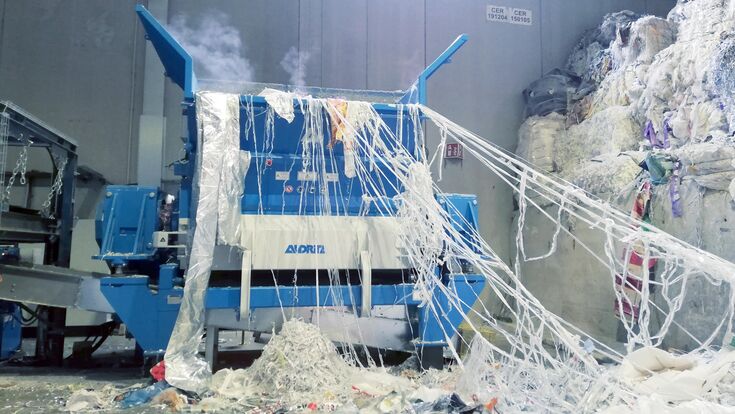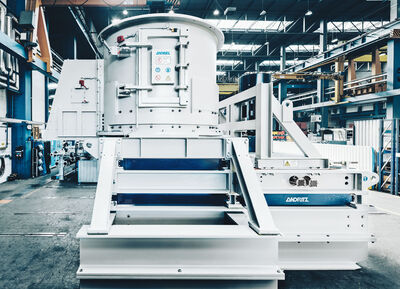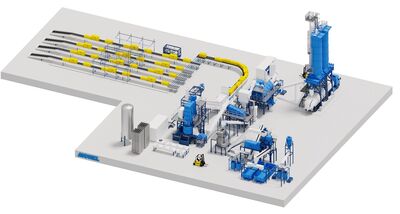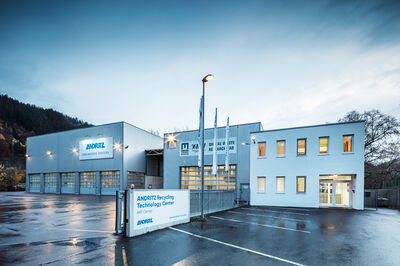Recycling : More with less

The new ANDRITZ ADuro P-3000F shredder is a very robust, slow-speed, single-shaft shredder that produces up to 10 tons of RDF per hour.
- © ANDRITZProduce more with less – it is hard to dispute the logic from a business point of view. Apart from being a formula for higher margins, it also reduces waste, which is an essential strategy to conserve resources and create a cleaner world for future generations.
ANDRITZ Recycling, part of the ANDRITZ Group, supplies equipment but is primarily dedicated to its role as a solutions provider. The best outcomes occur when knowledge, expertise, and understanding of customer needs and future trends are combined with machinery and technology in a fruitful partnership.
There are good reasons why ANDRITZ has risen rapidly in the world of recycling. In addition to its involvement in reject treatment and solid/liquid separation in the papermaking and wastewater sectors since long before it became a focus worldwide, the Recycling division has brought together several key players in industrial recycling through acquisition. This includes MeWa and Franssons in 2013 and 2017, respectively. The result is a powerful global force for service, sales, manufacturing and expertise. ANDRITZ customers benefit from extensive synergies to develop integrated plant configurations from the simple to the complex, always with a focus on lifecycle costs and performance, including minimized energy consumption.
Refrigerators – the ultimate white-goods challenge
One of the fastest-growing waste streams globally comes from the proliferation of electrical and electronic devices, which contain potentially hazardous materials, making their recycling a challenge. It is an area which ANDRITZ has conquered and no device exemplifies this better than the refrigerator. With Waste Electrical and Electronic Equipment Recycling (WEEE) regulations hot on the case, ANDRITZ has successfully applied its shredding technology, which is able to break down different composite materials quickly and gently to allow easy separation downstream, while components which contain hazardous substances, such as CFCs and pentane, can be safely disposed of without any negative impact on the environment or risk of fire. This is within a single-stage, fully encapsulated system for processing refrigerators and other white goods (cables included of course), the output of which includes steel and numerous other metals, plastics, printed circuit boards, transformers, compressors and polyurethane.

“We are well established in the area of refrigerator recycling and are set to be market leader, particularly with our new, patented technology for CFC capture, which enables our customers to minimize their OPEX as well as their maintenance effort drastically,” says Thomas Gemeiner, Vice President Recycling at ANDRITZ. There is huge demand for recycling of refrigerators, particularly as legislation becomes stricter and manufacturer responsibility takes effect.
“We benefit from dissemination of technology and expertise across the various sectors we work in – separation techniques are often quite similar for varied materials. For fridges, however, the safe retrieval and disposal of the blowing agent is key and makes the refrigeration sector highly defined in terms of recycling. But the same factors remain important which apply to recycling of all product categories: customers seek a solution which yields purity and quality so that recycled materials are ready to be sold or used in the most efficient way possible.”
ANDRITZ's digitalization solutions are the perfect complement to its expertise in advanced recycling processes. One example of this is the so-called “Chain Monitoring” system, which uses vibration signatures to analyze the condition of the shredding tool – the chain. Knowing about vibration patterns not only makes it easier to monitor the condition of the chain, but also provides insights into the condition of the material. This knowledge will pave the way for variable control of batch times, which will lead to improved process optimization in the future.

RDF – fuel of the future
Purity is also particularly important for Refuse-derived fuel (RDF). This is another area to which ANDRITZ’s portfolio of recycling technologies is consistently applied, particularly because the many different materials which need to be separated into high- and low-calorific fractions using shredding, screening, sorting and classifying.
“High throughput with low energy consumption is always the target,” says Johannes Stindl, Director Global Product Management Recycling at ANDRITZ. “We have to understand the needs of our customers to be a valuable partner, both in R&D and in our daily cooperation. We are always looking for opportunities with customers to implement new process steps and in the end, if there is a high yield, then there is a willingness to invest in a more sophisticated solution. Our technology helps create a more sustainable world but we never forget that financial sustainability is at the heart of environmental sustainability. Our customers are businesses.”
With combustion efficiency for RDF in mind, the moisture content of materials is becoming more important. Plastics have a high calorific value, so as high-purity plastics become more efficiently removed from the RDF stream, ANDRITZ is highly aware that it is even more critical to maximize the combustion potential of what remains.
Industrial-scale testing
The ANDRITZ Recycling Technology Center, ART for short, in St Michael, Austria, is set up to conduct tests with a wide variety of materials in real-world conditions on industrial scale. From primary and secondary shredding to fine granulation and dismantling of composites, trials can be conducted with a broad range of waste streams, supplied by the customer or ANDRITZ, simulating complete processes and providing proof both of capacity and output quality.
ANDRITZ Recycling is able to use the facility to perform its own research & development: evaluating machine settings and configurations, testing prototypes, processing new raw materials and networking with other test centers. But equally important is the work which takes place on customer sites, where ANDRITZ supports investigation into innovative solutions to address the evolving challenges and opportunities of recycling.

Solutions for increasing complexity
Complexity is increasingly a feature of recycling. “Where years ago, waste material that wasn’t easy to recycle was usually sent to landfill, it is now typically recycled or incinerated as alternative fuel. This makes the required processes more sophisticated,” says Franz Frühauf, Sales Director Recycling at ANDRITZ. “This is why it is no longer sufficient just to supply equipment. Instead it is essential to be a solutions provider with the competence to process manufactured goods and packaging with multiple elements into valuable raw materials and RDF. While the input quality of waste material is reducing, with rising levels of contaminants, the output quality has to rise. This is the challenge. If you can, as we do at ANDRITZ, rise to this challenge then it is a major competitive advantage.
“While we thrive on working with customers on solutions which are individual to their needs, we are also aware of the benefits of standardization,” continues Franz Frühauf. “Our technology needs to be viable at all levels, and where single-step standardized solutions are appropriate, we provide them and are developing this capability continuously. We never lose sight of the importance of cost and speed of delivery where these are the dominant concerns. We are supportive of our customers in achieving their ESG goals, and keeping the planet green, but the means to achieve these ambitions is not uniform.”
An aspect of the increasingly sophisticated nature of recycling is automation, focusing on the demand for cost efficiency and process improvements in general. This is where ANDRITZ’s Digital Solutions platform Metris has its niche. Through AI-support, including the use of ML algorithms for mass balance feedback, for example, ANDRITZ can help customers gain clearer insights into the nature of their input materials, eliminate bottlenecks and make data-driven decisions to improve processes. Refrigerator recycling and RDF are ideal applications for this approach.
Global presence, global synergies
“Our customers are benefiting more than ever from the ANDRITZ family with its global technology knowhow and presence,” concludes Thomas Gemeiner. “The technology and expertise synergies ensure we have all bases covered, from physical processes such as drying, pelletizing and separation, to services including cyber security. As the materials on the input side and expectations on the output side become more challenging, we are determined to meet and exceed regulations and expectations to make the world more sustainable, and customers more competitive through efficient, effective solutions.”
Contact information:
Website: www.andritz.com/recycling
E-mail: recycling@andritz.com
Youtube: Recycling - YouTube
LinkedIn: ANDRITZ Recycling
